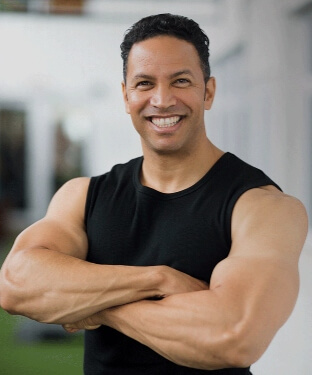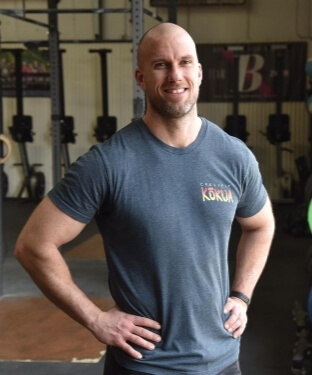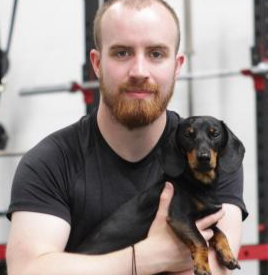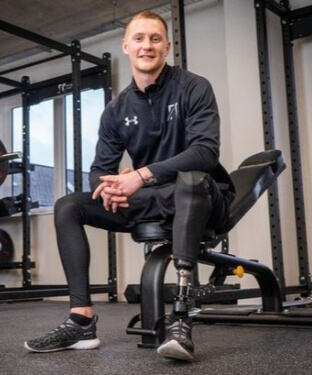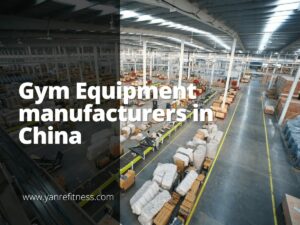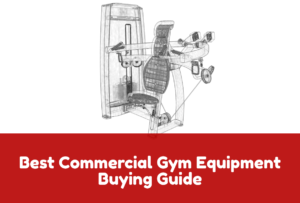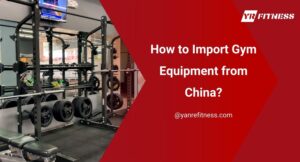Gym Flooring Manufacturer in China
Built by athletes, for athletes.
Built tough to handle every strength training.
Built with precise movement angles since 1997.
Products We Have for You
Showing all 8 results
-
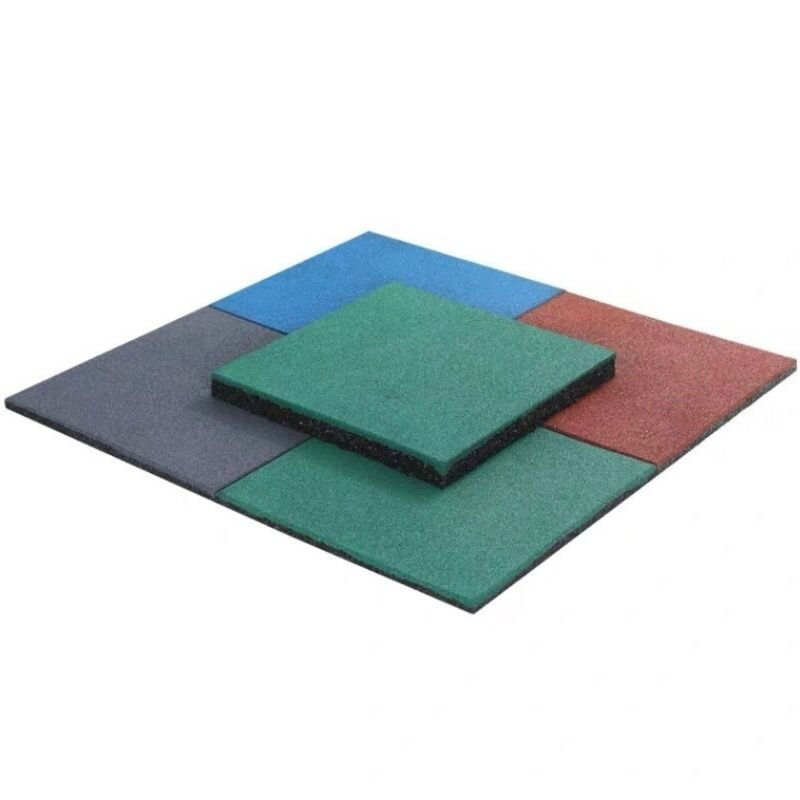
Interlock Gym Floor
$5.00YR Fitness Interlock Gym Floor GMB-1000 Series provides a safe, durable surface for any training space. With easy-t
-
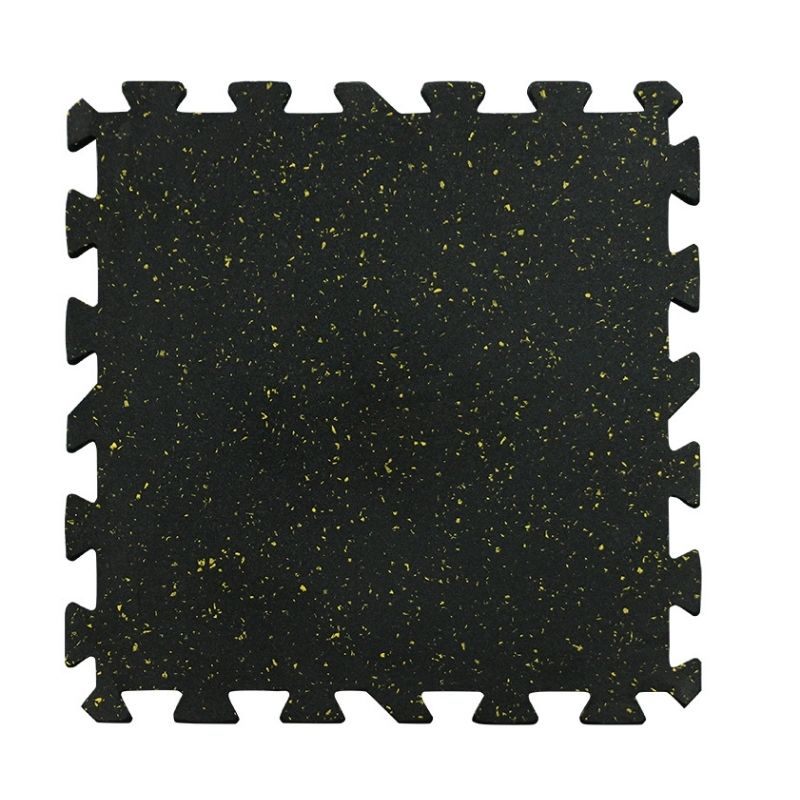
Interlock Gym Floor
$5.00YR Fitness Interlock Gym Floor GMRB-04/GMRB-05/GMRB-06/GMR-08/GMRB-10 is designed to protect floors and reduce nois
-
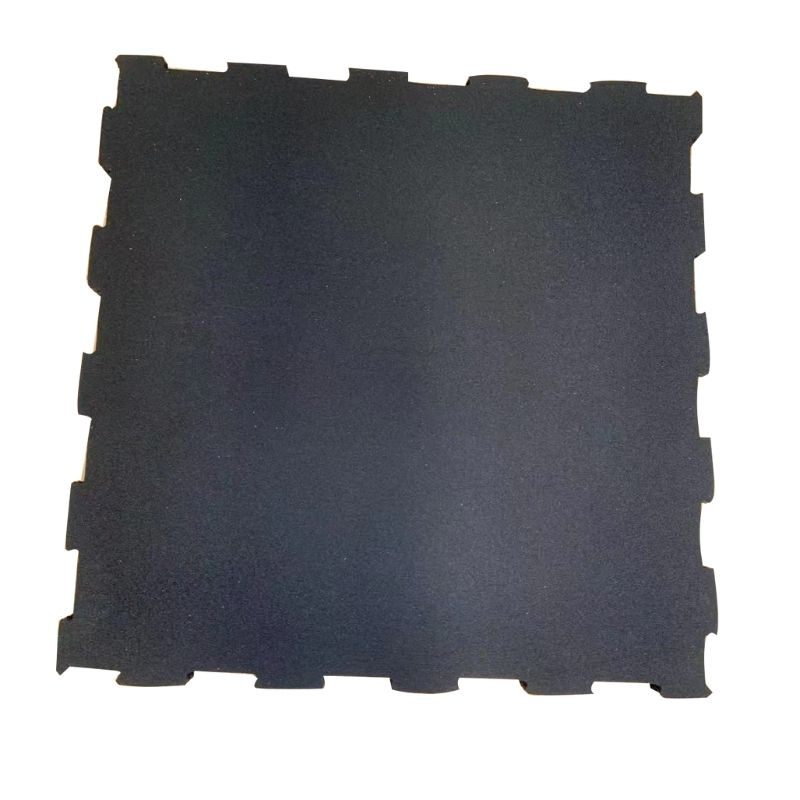
EVA Mat
$5.00YR Fitness EVA Mat GMBI-1000-15/20/25 provides a cushioned, non-slip surface for safe and comfortable workouts. Mad
-
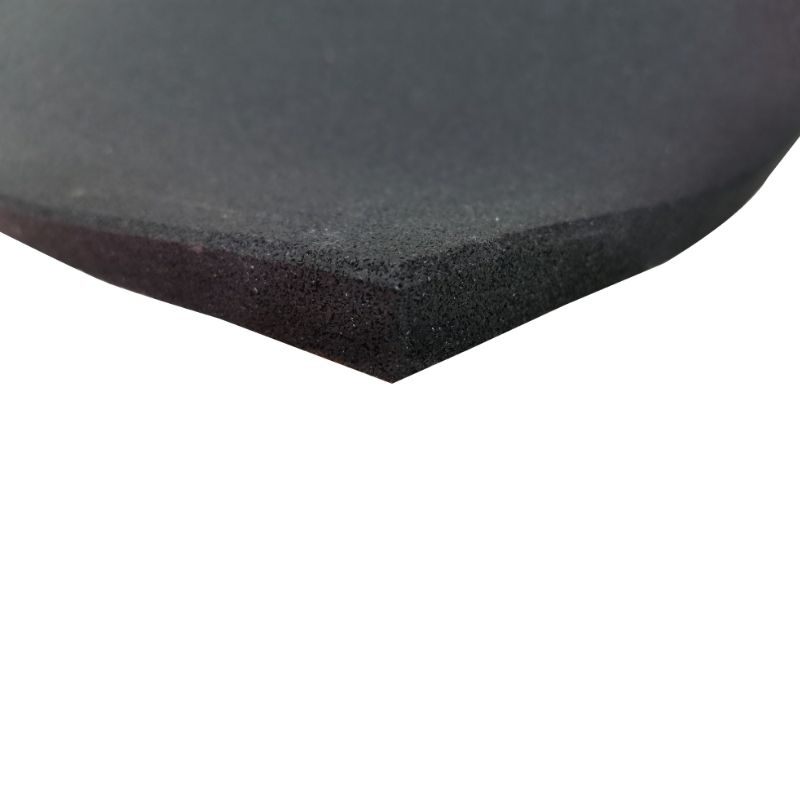
EVA Mat
$5.00YR Fitness EVA Mat GMBF-1000-15/20/30 is a durable, cushioned mat that protects your floor and supports your workou
-
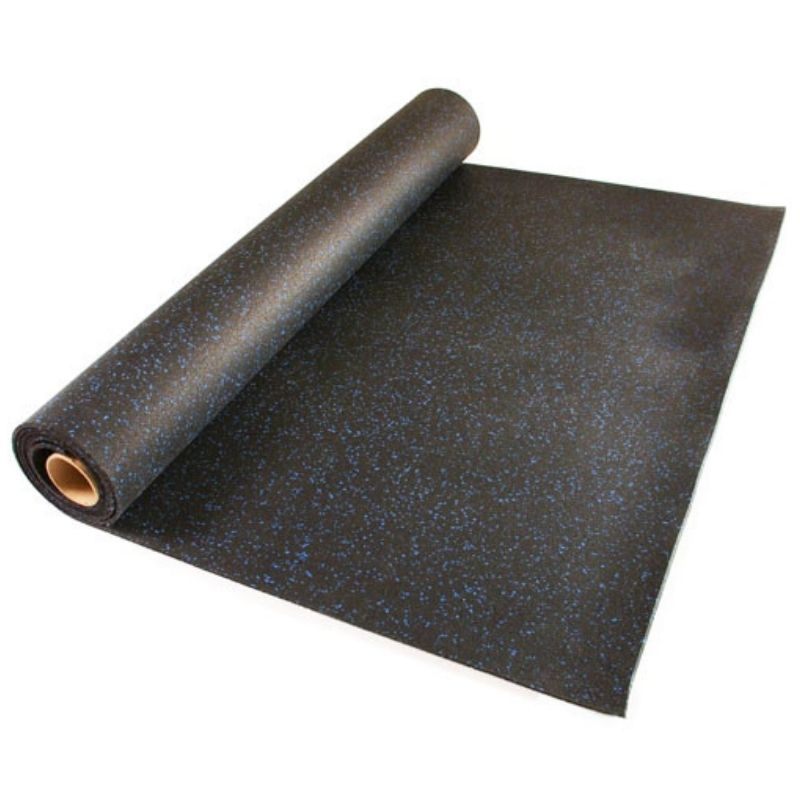
Gym Roll
$5.00YR Fitness Gym Roll GMR-04/GMR-05/GMR-06/GMR-08/GMR-10/GMR-12 offers a safe, cushioned surface for workouts of all
-
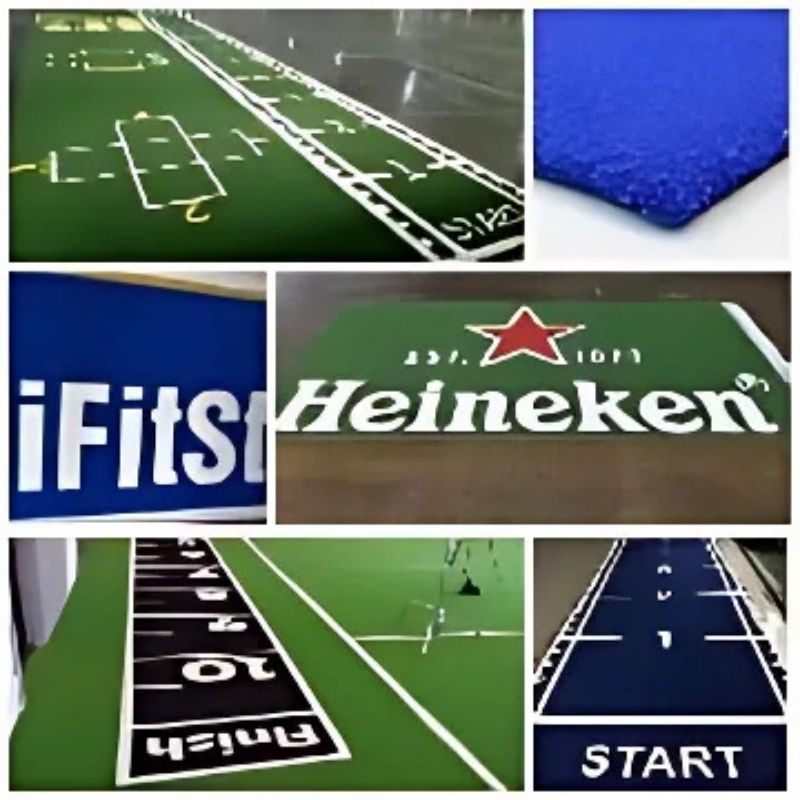
Crossfit Turf/Sled Turf
$5.00YR Fitness Functional Training Turf YNTF-02 is a strong, high-grip surface made for sled pushes, sprints, and funct
-
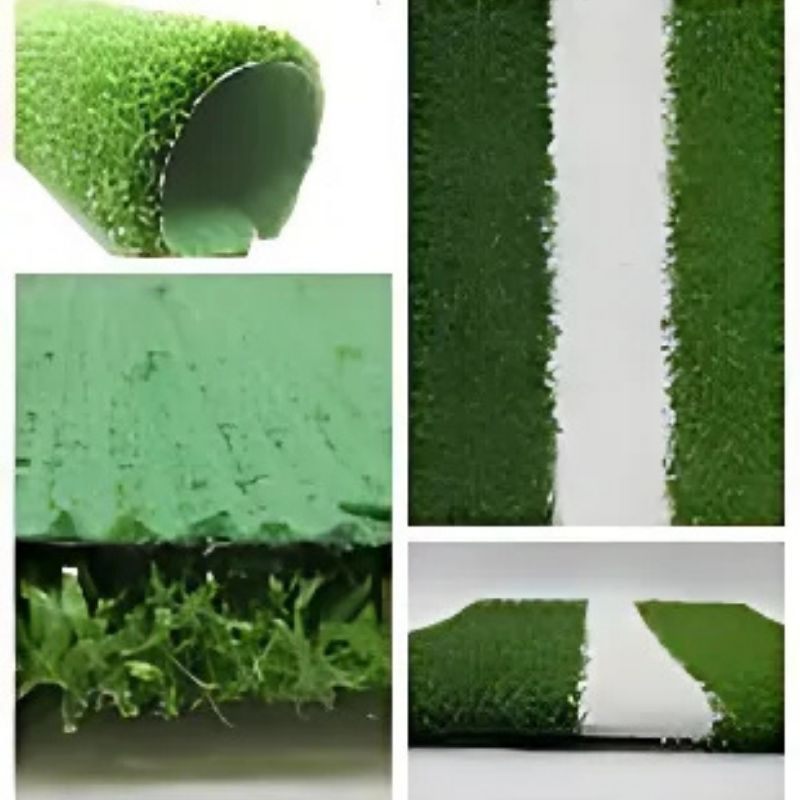
Crossfit Turf/Sled Turf
$5.00YR Fitness Crossfit Turf YNTF-01 is made for intense training like sled pushes, sprints, and functional workouts. I
-
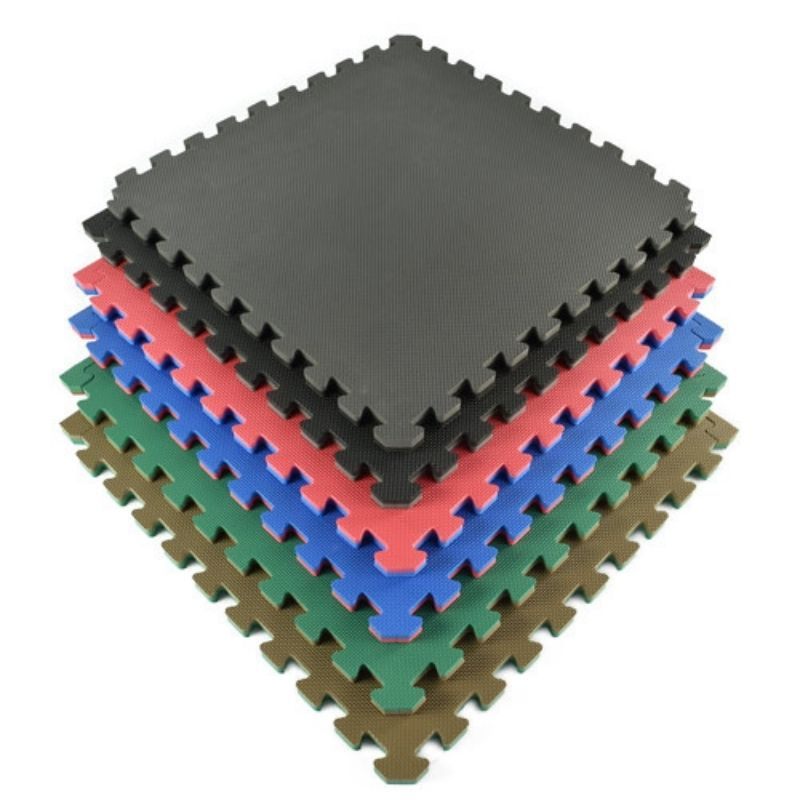
EVA Mat
$5.00YR Fitness EVA Mat EM1000-20/25/30 is a cushioned, durable foam mat ideal for home gyms, studios, and martial arts
Certified by Global Standards
Backed by CE, TÜV, and ISO certifications so you can buy with full confidence in safety and performance.

DESIGNED By ATHLETES,
FOR ATHLETES
At YR Fitness, Design Transcends Aesthetics.
It’s About Functionality.
Simple, But Significant.
Only True Feedback Counts
Quality Standard of YR Fitness
That’s why we are confident to compete with big brand quality, but at 1/5 price.
Built with Strength: 3.0mm Solid Steel Pipes
We use thick 3.0mm+ Q235 steel pipes for every part of the machine — whether it’s the frame or the training area, no matter the size. With added reinforcement bends, our machines stay strong and steady. No shaking, just solid power.

This is How We Make Your Gym Equipment
Over 20 years, YR Fitness has put $8M into tech—just to bring you better machines.
100% Original Design Since 1997
Because Great Design Makes Great Machines.
Pulley Output Ratio
Leveraging the power of physics, we’ve tailored our pulley output ratio for optimal training. Take our butterfly machines: a 2:1 ratio means a 70kg weight selection delivers a 35kg training load. This higher ratio enhances your workout and saves on weight plate costs.
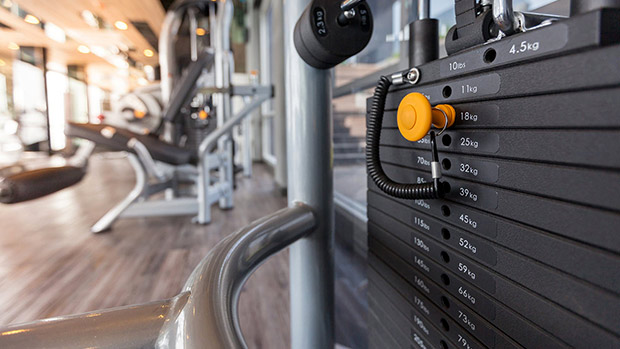
Compare Our Key Series
73 Series
Heavy-Duty Frame
Pro-Level Movement
High-End Line
61A Series
Durable
Affordable
Best-Selling
C4 Series
Modern Look
Upgraded Fusion
More Features
Quick Comparison At A Glance
Feature | 73 Tough Series | 61A Racing Series | C4 Revival Series |
|---|---|---|---|
Launch Year | 2008 | 2016 | 2025 |
Design Focus | High-end performance and biomechanics | Space-saving, budget-friendly, market-driven | Combines 61A’s simplicity with 73’s advanced features |
Frame Tubing | 75×130×3.0 mm (main) + 58×101×3.0 mm (functional) | 75×118×3.0 mm (main) + 50×120 / 40×80 / 50×100 mm | 150×50×3.0 mm (main) + 50×120 / 40×80 / 50×100 mm |
Aesthetic Design | Parabolic, bold, aluminum accents | Compact and practical | Stylish, modern, fits younger gym aesthetics |
Durability Level | Heavy-duty, custom-engineered components | Very durable, many still running after 20+ years | Same durability level with upgraded styling and adjustability |
Movement Types | Independent converging/diverging paths | Standard movement paths | Includes both standard and independent paths (split models) |
Adjustability | Basic adjustability | Standard user adjustability | Advanced: rotating handles, adjustable pads, backrests, etc. |
Innovation Level | First of its kind globally in 2008 | Refined through years of customer feedback | Integrated innovation from both series + unique new machines |
Series Size | 62 models | 62 models | 74 models (still expanding) |
Target Buyer | High-end gyms, serious training centers | Budget-conscious gyms, franchise chains | Gyms that want both performance and style |
Pricing | Premium | Most affordable | Mid-range, with excellent feature-to-price ratio |
Production Method | Partially handmade due to complex design | Fully industrialized | Industrial production with some specialty detailing |
After-Sales Service | Lifetime support | Lifetime support | Lifetime support |
Let’s Talk
Commercial Gym Flooring – Definitive FAQ Guide
Are you establishing your commercial gym? Are you looking for something to help you figure out which type of floors you should have? Or are you a wholesale distributor looking for commercial gym flooring options to present to your clients? Congratulations! You are in the right place.
We are aware of the multiple options available in the market. We know that looking for an option that is your fit can be hard. That is why we have compiled a FAQ Guide to help you understand all that is available in the market. It will help you in choosing the very best for your business.
Table of Contents
- 1. What type of commercial gym flooring options are available?
- 2. What types of commercial rubber gym flooring options are available?
- 3. Which type of commercial gym flooring is best?
- 4. What should be the thickness of the commercial gym flooring?
- 5. How much will commercial gym flooring cost?
- 6. Does the flooring need to be waterproof?
- 7. Will I need professionals for the commercial gym flooring installation?
- 8. Do I need an underlay below the gym flooring?
- 9. Will the flooring make my commercial gym noise-proof?
- 10. How can I properly maintain the gym flooring?
- 11. Can I install eco-friendly commercial gym flooring in my gym?
- 12. Can I customize my flooring according to specific colors?
- 13. Is it necessary to cover every inch of the space with flooring?
- 14. Is flooring affected by the changes in temperature?
- 15. Conclusion
1. What type of commercial gym flooring options are available?
The multiple flooring options available based on the materials used are:
- Foam
- Wood
- Vinyl
- Turf
- Rubber
- Carpet
- Cork
Foam Gym Flooring
This type of commercial-grade gym flooring is made from high-quality EVA. It is easy to install. Foam tiles are ideal if your gym does not see heavy-weight usage and mainly caters to MMA-style fighting athletes.
PROS:
- Cheap
- Easy to install
- Great for cushioning, comfortable
CONS:
- Less durability
- Prone to damage by heavyweight equipment
- Low traction especially when wet.
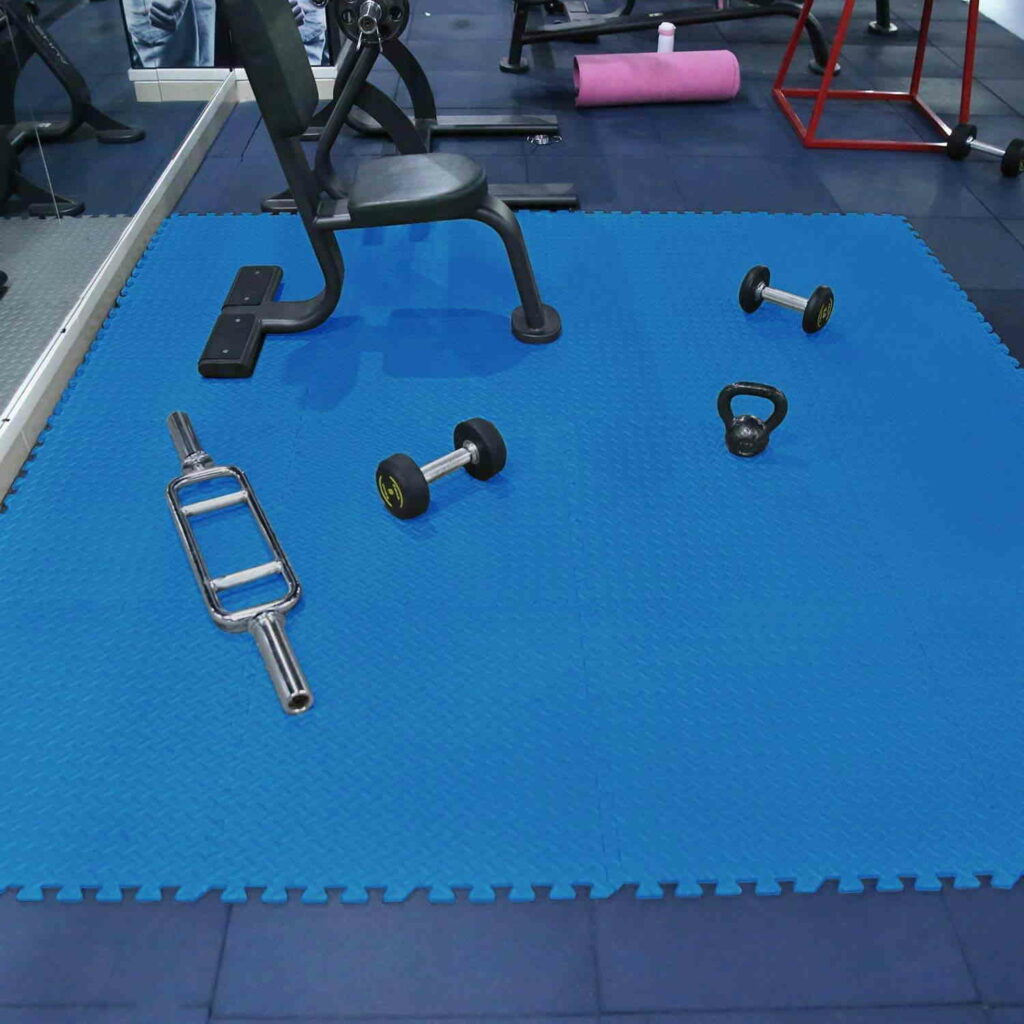
Figure 1: Foam Gym Flooring
Wood Flooring
Wood flooring gives your gym a wonderful aesthetic. But it is liable to damage by heavy machinery and free weights. There is also the matter of the hardwood floor having no shock absorbance. If your athletes fall, they will get more injured. If you choose hardwood flooring, it would be best to pair it with some sort of mats. Wood floor is also liable to splintering, which can be a source of injury to gym members.
PROS
- Aesthetically pleasing
- Suitable for gyms more focused on dance, kickboxing style training
CONS
- Expensive
- Prone to damage by free weights and other equipment
- No shock absorbance
Vinyl
Vinyl flooring can allow you to take more liberty with the colors. It is easily cleanable and durable. The only drawback is that it can be damaged by sharp objects. moreover, it cannot absorb shock.
PROS
- Easy installation
- Versatile
- Easy to clean
CONS
- Expensive
- Susceptible to damage
- Limited shock absorbance
Turf
Turf flooring is another option that is both durable and aesthetically pleasing. They can withstand heavy traffic and are great shock absorbents. Hence providing the gym-goers with safety. It does not offer much sub-floor protection from heavy machinery.
PROS
- Aesthetic
- Shock absorbent
- Durable; will last for a long time
CONS
- Expensive
- Little to no sub-floor protection
- Hard installation
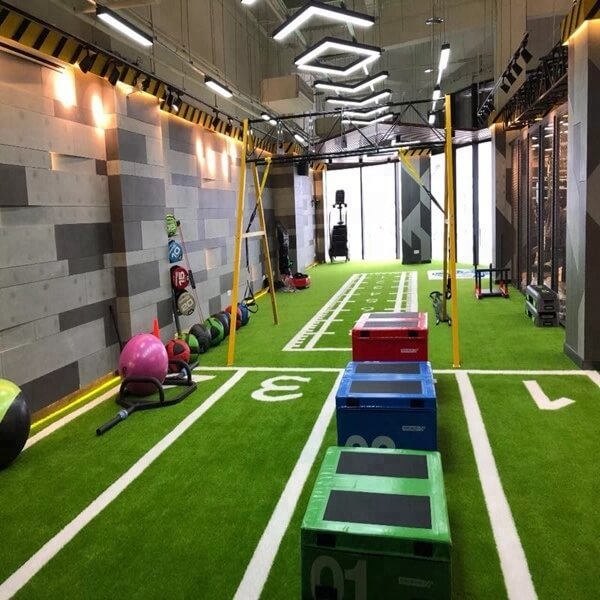
Figure 2: Turf Flooring
Rubber
Rubber is the most popular option for commercial gym settings. it is due to its versatility and superior damage-resistant capabilities. It is a relatively inexpensive form of flooring as it can be more easily maintained.
PROS
- Durable
- Shock-absorbent
- Easy installation
- Damage resistant
CONS
- Expensive (but requires less maintenance so cheaper in the long run)
- Rubbery smell
- Low insulation
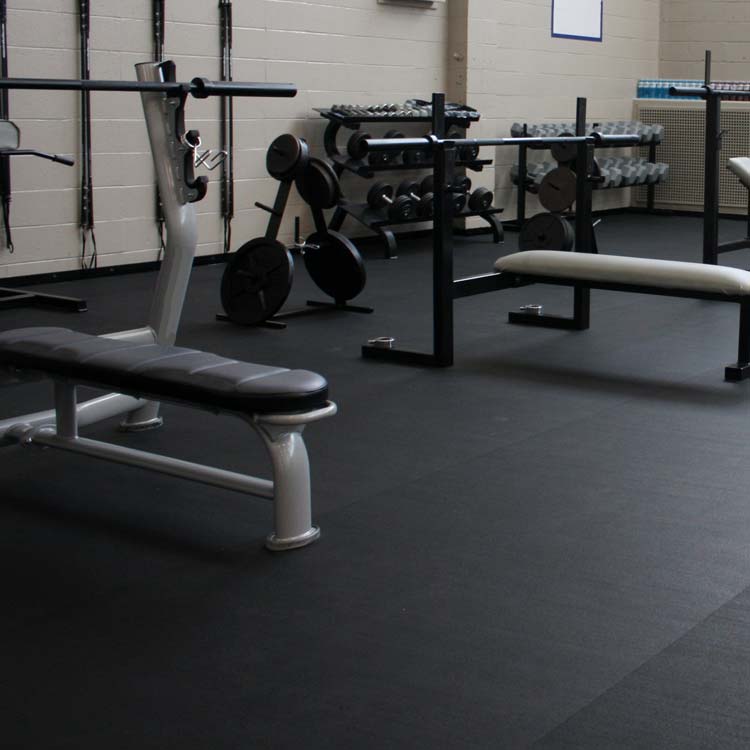
Figure 3: Rubber Flooring
Carpet
Carpet flooring is one of the rarer forms of flooring. It does reduce impact and cushions falls. But it absorbs sweat, moisture, etc. which can cause mold to grow. It can also absorb smells and requires frequent replacement.
PROS:
- Inexpensive
- Shock absorbent
CONS
- Not durable
- Becomes smelly after prolonged use
- May become infected by mold etc.
- Sub-floor will be damaged if a free weight falls etc.
Cork
Cork as a flooring material is tempting because it is eco-friendly and inexpensive. It is also great for shock absorbance and will cushion falls. However, it is very easily damaged. It cannot withstand the impact when heavyweights fall or when heavy machinery is dragged around.
PROS
- Inexpensive
- Eco-friendly
- Cushions fall
CONS
- Not durable
- More susceptible to damage from heavy impact
For more information regarding the types of materials that can be used in flooring please refer to our Best Gym Flooring Buying Guide.
2. What types of commercial rubber gym flooring options are available?
Rubber flooring is available as
- Rubber Rolls
- Rubber Tiles
- Rubber Mats
You can use any of the above according to the area you wish to cover and how that area is going to be used. If you are a gym flooring supplier, having all options available is mandatory since you will be dealing with various clients with different requirements.
Rubber Rolls
- Long sheets of rubber are ideal for covering large spaces.
- Less likely to get damaged.
- Have traction and are easy to install.
- Great for impact reduction and are unlikely to get damaged by falling equipment
- Can be installed on any type of subfloor. Such as concrete, wood, or any other form.
- will protect that sub-floor from damage.
Check out YR Fitness for our commercial-grade gym flooring.

Figure 4: Rubber Rolls
Rubber Mats
The only difference between rubber rolls and rubber mats is that rubber mats are smaller in size. You can place rubber mats in small spaces or areas designated for heavyweights. Check out our rubber mat collection on our website.
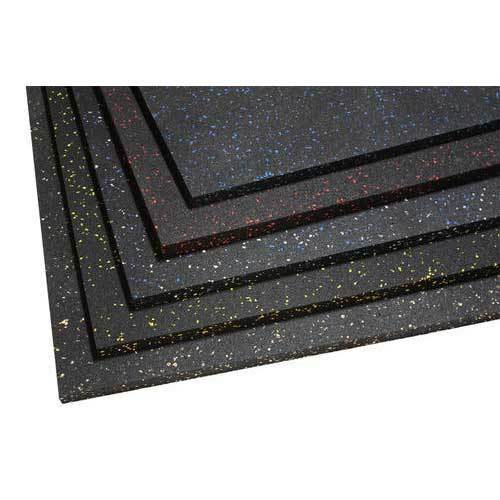
Figure 5: Rubber Mats
Rubber Tiles
Rubber tiles are made from the same material as rubber rolls. They come with interlocking edges that allow them to be connected. They offer all the perks that a rubber roll provides. Some of them are durability, impact reduction, traction, and protection to the actual floor.
The only difference is that these can be modified to fit any room, making them ideal for small spaces. The only drawback is that they may become disconnected, but that can be fixed by gluing them together.

Figure 6: Rubber Tiles
3. Which type of commercial gym flooring is best?
According to our experts, rubber flooring is the best gym flooring option for any gym. it is due to its durability, versatility, and availability in various thicknesses.
They have excellent shock-absorbing capabilities. That means it will keep the joints of the trainers from getting injured. They are the industry choice for commercial gym floors.
4. What should be the thickness of the commercial gym flooring?
The optimal thickness for commercial gym flooring is 3/8 inches (9.5mm). However, it can vary anywhere from ¼ inches (6.35mm) to 1/2 inches (12.7mm). If there are areas of the gym that are seeing more heavyweight usage such as the deadlift area etc. It is best to use ½ inch flooring for better impact distribution.
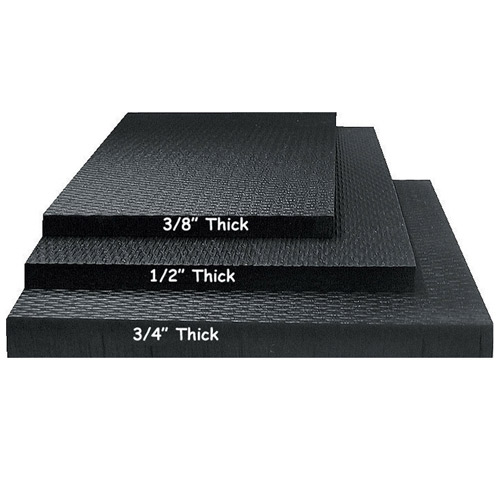
Figure 7: Flooring Thickness
5. How much will commercial gym flooring cost?
The price of the flooring can range from $2 to $18 per square foot depending upon the material used. The price for vinyl or wood flooring can be way higher entering the thousand-dollar line per square foot.
For example, commercial gym mat flooring made from rubber can range from $40 to $150 per mat. On the other hand, rubber tiles and rolls are priced per square foot. So, the price will go up as the area of the gym increases.
6. Does the flooring need to be waterproof?
Yes, it is recommended that the flooring be waterproof. This is because if the flooring is water absorbent it may give rise to mold or other infections. It can be a serious concern when it comes to safety and can lead to trainers getting sick.
Another reason why being waterproof is necessary is because a lot of flooring types are liable to damage if they become drenched in water.
Commercial gyms receive a lot of people. While sweating isn’t a big concern if it is just one person, multiple heavy sweaters can pose a problem. That is why your flooring needs to be both water and odor-proof.
7. Will I need professionals for the commercial gym flooring installation?
It depends on the type of flooring you use. Rubber flooring is easy to install by yourself, especially tiles and mats. However, rubber rolls are hard to install due to their weight. You will need a bunch of people to help you get the job done.
On the other hand, when it comes to turf installation it is best to let the professionals do it because the installation process can be tough. Most gym tiles manufacturers provide an installation guide with the product.
The manufacturing guide provides you with the installation process. It also tells you whether or not professionals are needed. Here is a video that you can refer to observe the installation process:
8. Do I need an underlay below the gym flooring?
Yes, if you are using the less shock-absorbent flooring, you will need to install underlays. Underlays will absorb shock which reduces noise and stabilizes the floor. Underlays are also useful for protecting the actual floor from damage in case a heavyweight is dropped etc.
It prolongs the life of your flooring. Some flooring types require the use of underlay for installation. There are different types of underlays. We recommend you use an underlay that is correspondent to your flooring type and foot traffic.
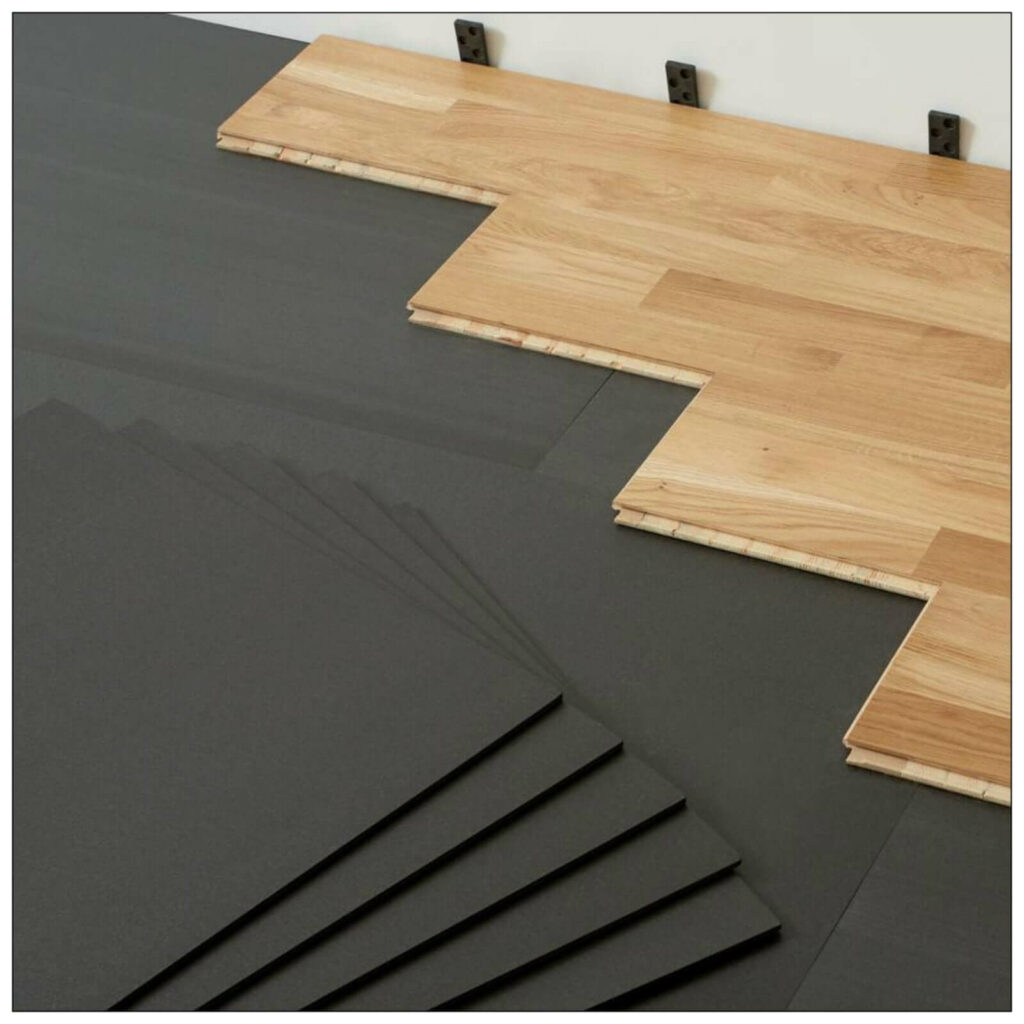
Figure 8: Gym Flooring Underlay
9. Will the flooring make my commercial gym noise-proof?
It depends on the type of flooring you use. Rubber flooring is generally great for sound reduction. Another trick for figuring out whether or not your commercial gym flooring will be soundproof is checking its impact reduction capacities.
The more shock absorbent a flooring type is, the more it also reduces the sounds.
Another way to reduce the noise is by placing underlay or additional flooring-like mats in places where weights are likely to fall. It is especially important to check for soundproofing if your gym is on the higher floors.
10. How can I properly maintain the gym flooring?
Most flooring types are cleanable with just a soap solution with water. However, if some flooring types do require special cleaners, you will find that information in the product manual. For further information regarding maintenance, you can always contact the manufacturers.
11. Can I install eco-friendly commercial gym flooring in my gym?
Cork flooring is a good option when it comes to being eco-friendly. But the drawback of using cork is that it is too fragile. Itt can become damaged simply by moving heavy machinery across it. You could couple cork with mats after designating a special area to heavy machinery.
Some manufacturers use recycled materials to make their rubber flooring which also qualifies as being eco-friendly. Examples of environmentally friendly flooring options in YR Fitness are the EM1000 and GMRB series of rubber tiles.

Figure 9: GMRB Series (Eco-Friendly)
12. Can I customize my flooring according to specific colors?
We have various color options available when it comes to gym flooring. However, if you still wish to customize your chosen flooring, you can always contact the sales department for YR Fitness. So that we may do our best to accommodate your desires and wishes.
13. Is it necessary to cover every inch of the space with flooring?
While you can get away with leaving the edges without any flooring, it is not recommended. Any loose edges or gaps in flooring can accumulate dirt and moisture which compromises the hygiene of the gym.
It is also a safety hazard, as the gym members may trip on the edges. You can use tiles to cover any small crannies that may have been left exposed.
14. Is flooring affected by the changes in temperature?
Yes, the flooring is liable to thermal contraction and expansion with the temperature changes. That is why it is best to leave the flooring unglued for a day or two, so that it may grow more compatible with space. You can also install joints between the spaces to soothe any additional concerns.
15. Conclusion
We hope that the detailed FAQ guide addressed any questions, you might have had about finding the perfect flooring for your commercial gym. If you still have more questions, you can always contact us at YR Fitness. We will do our best to accommodate you.
While you are here, feel free to take a look at our gym flooring options to choose a fit for your gym. The products bear the burden of being the best gym flooring options in China.


